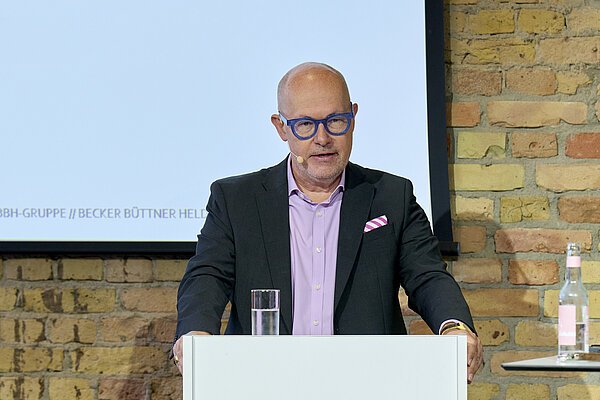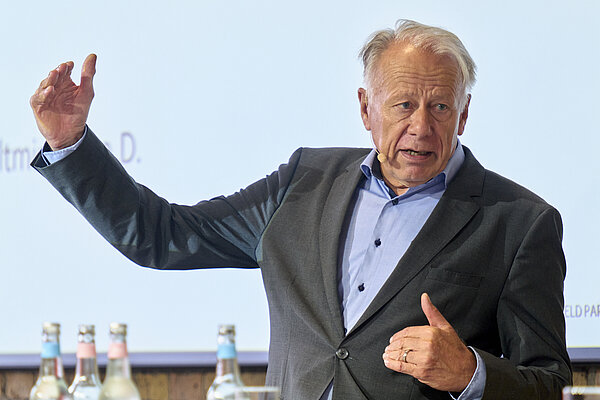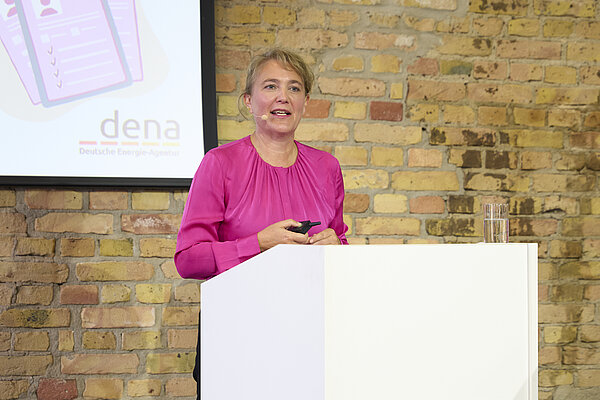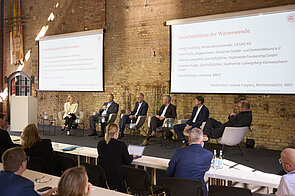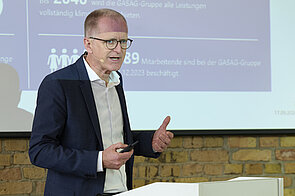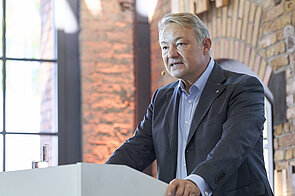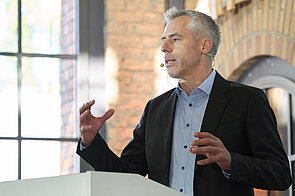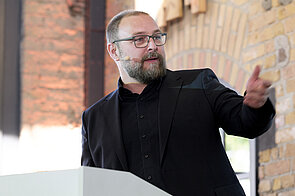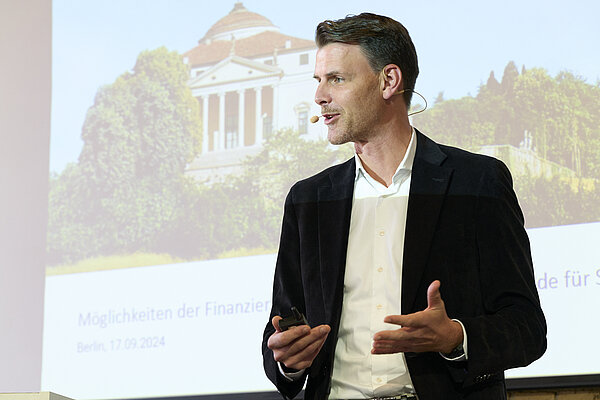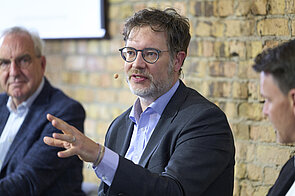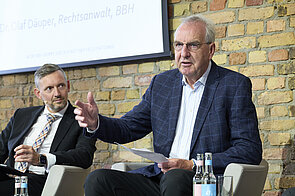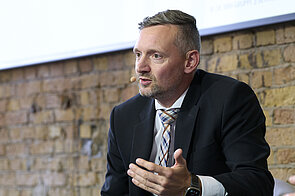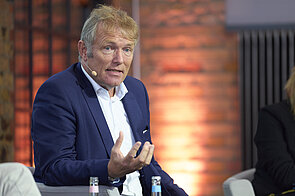On the sunny Tuesday morning, BBH partner and lawyer Prof. Dr. Christian Theobald welcomed approximately 70 attendees to the official event at EUREF Campus, “a site where 5,000 people are working towards the future with research and learning in the areas of energy, mobility and sustainability.” The campus can be regarded as a transformation think tank, making it the perfect venue for the BBH group’s third Climate Working Group Conference. This year’s conference centred on the municipal heat transition. The first part of the event focused on the building blocks and challenges of the transition examined on the basis of presentations and specific case studies, while the second part dealt with the nuts and bolts of the transition: money. The financing of the municipal heat transition was the subject of two keynote speeches and a panel discussion. “This is a pressing issue, because in the end the transition should not come down to money,” stated Theobald.
Prof. Dr. Christian Theobald © Mike Auerbach
The first contribution dealt with the general aspects of the energy transition in Germany – a topic for which there could hardly be a more suitable speaker than Jürgen Trittin, the seasoned member of the Greens and former Federal Minister for the Environment, who was a firm advocate of the nuclear phase-out. He began by illustrating the ubiquitous effects of climate change, before moving on to the topic of the conference: The municipal heat transition concerns approximately 40 percent of the German greenhouse gas emissions. Trittin recalled the beginnings of the energy transition: the revision of the German Atomic Energy Act (nuclear phase-out), the Renewable Energy Sources Act and the introduction of emissions trading. A story of success according to Trittin: “With the energy transition, we chopped two onions with one knife, nuclear and coal-fired power plants.” This also helped improve security of supply in Germany. As regards the municipal heat transition, Trittin emphasised the need for reliable financing. He emphasised the urgency of the energy transition as well as the special role that the municipal heat transition plays in this context, and he gave the attendees the following piece of advice: “Think globally, act locally.”
Corinna Enders, chair of the management board of the German Energy Agency (dena), outlined the most important next steps regarding the climate and heat transition at local and regional level. First of all, she looked at the buildings sector: Heating technologies must be decarbonised, buildings must be renovated and heat networks must be expanded and converted. She pointed out that heat generation still relies heavily on fossil fuels (78 percent). Enders also addressed the topic of “communication” and attributed this year’s slump in the sale of heat pumps mainly to a loss of consumer confidence and trust. Regarding the current state of municipal heat planning, Enders found that more than a third of the municipalities have already started their planning. According to a survey, a lack of human and financial resources is one of the main reasons why municipalities have not yet started their heat planning. In addition to financing, Enders identified a second major challenge associated with the municipal heat transition: social acceptance. “If we don’t make sure the public is on board, the heat transition won’t succeed.”
BBH partner and lawyer Juliane Kaspers chaired the first panel of the event, whose panellists took stock of the heat transition so far – based on their practical insights from the perspective of suppliers, cities, towns and municipalities as well as consultants. Among the panellists was Georg Friedrichs, chair of the executive board of GASAG AG, who expects Berlin’s heat plan to be completed, as required, by 2026. Particularly encouraging is his finding that Brandenburg’s small municipalities will finalise their heat plan well ahead of the schedule; a third of the municipalities will be done in 2025. He went on to present two projects based in Berlin: a new neighbourhood whose energy demand is met by geothermal energy, and a project that is to be supplied by waste heat from data centres. Volkmar Langefeld, managing director of Stadtwerke Frankenthal, then reported on the construction of a new 90-kilometre district heating network. An industrial sewage treatment plant is at the core of the network and provides waste heat. Langefeld highlighted two problems: First of all the issue of financing, as the design of the Federal Funding for Efficient Heat Networks (BEW) programme is not “bankable” in its current form and lacks technological openness, which means that energy-efficient schemes involving heat pumps cannot be combined with CHP installations. In this respect, he hopes to see more technological openness and more flexible funding. The second issue is communication – which had already been mentioned earlier the same day. “The current federal government has done a lot to considerably increase the level of uncertainty and fear among the general public, the industry and also the administration.” So there is still a lot of unnecessary persuading to be done. The next speaker was Johannes Rager, managing director of Stadtwerke Ludwigsburg-Kornwestheim in Baden-Württemberg, where municipal heat planning became obligatory much earlier than in other federal states. For him, the task at hand is to interconnect eight existing heat networks. The heat fed into these district heating networks is partly generated by Germany’s largest solar thermal facility. Rager believes that “projects are gaining momentum thanks to municipal heat planning. Municipal heat planning is a game changer.” BBH partner Roland Monjau then summed up the status quo of municipal heat planning and took a more fundamental look at the development of products. The question for suppliers is: What do we want to sell? Considering, for example, district heating versus heat pumps. He identified grid expansion as the biggest challenge. “It will be a marathon. And it will be an exciting task to make politicians stay on the ball.” Last but not least, Timm Fuchs, councillor at the German Association of Towns and Municipalities, provided a different perspective on where the municipal heat transition is standing. He pointed out that the heat transition had got off to a rocky start, which contributed to the uncertainty in the municipalities and ultimately led to the fact that very often the necessary framework conditions are not yet in place. The social aspects of the transformation and the future of the gas grids were two of the main points discussed afterwards. Furthermore, a potential regulation of heat grids was addressed. All panellists agreed that this would negatively affect the speed of the heat transition.
The second part of the conference day was dedicated to the financing of the municipal heat transition. Dr. Tobias Brosze, managing director of Palladio Kommunal GmbH, began by presenting financing approaches for municipal infrastructure projects which include strengthening municipal equity, expanding debt capital and, finally, using third-party equity. For the latter, he said, a viable business case is needed – and third-party equity could only be used through a direct investment at lower company levels or a lease model, but not through a direct investment at the level of an entire energy supplier.
“The debt brake, a special-purpose fund and climate protection as a joint task under Article 91a of the German Basic Law” was the topic of Prof. Dr. Johanna Wolff’s speech. It all started, of course, with the judgment of the Federal Constitutional Court of 15 November 2023 which deprived the Climate and Transformation Fund of substantial funds that had been earmarked for financing the transformation. In her speech, Wolff put forward three reform proposals. The first proposal was to abandon the debt brake or make it much less rigid. The second proposal also aimed to increase the room for manoeuvre with regard to the debt ratio, but to limit it to specific areas or tasks. It is modelled on the special-purpose fund for the German Armed Forces, which was set up after Russia’s attack on Ukraine. The third approach is to reallocate available funds. According to Wolff, “all three options hold their appeal”. However, she also acknowledges that it remains unclear whether a political consensus could be reached.
BBH partner and lawyer Dr. Olaf Däuper was the opening speaker of the day’s second panel, which featured Dr. Tobias Brosze and Prof. Dr. Johanna Wolff. Among the panellists was also Dr. Götz Brühl, managing director of Stadtwerke Rosenheim GmbH & Co. KG, who said that the lack of human and financial resources was an enormous problem. “The lack of funding is delaying or stalling the energy system transformation,” stated Brühl. His proposal: We should rather slow down the heat transition, aim for climate-neutrality by 2060 instead of 2040, and reduce carbon emissions by 95 percent instead of 100 percent. Finally, he addressed an issue that had already been raised in the first panel: “If regulation is introduced in the district heating sector, this will put the brakes on investments.” The next speaker was BBH partner, public auditor and tax advisor Tobias Sengenberger, who began by stating that the heat transition can only be financed “if the income situation of the municipal utilities is stable”. He argued that policymakers must ensure a stable pricing system for heat supply. According to Sengenberger, most of the required investments will be financed by banks. However, this requires projects to be bankable. Then Stefan Tessin, senior banker for German public sector clients at UniCredit Bank GmbH, took the floor. As a word of caution, he said that municipal utilities needed to be more transparent with lenders of debt capital. He concluded with a “slightly positive outlook”, stating that, in his opinion, municipal utilities constitute an asset class that is very stable compared to other industries.
At the end of the conference with many insightful case studies, exciting discussions and interesting ideas, Prof. Dr. Christian Theobald bade farewell to the attendees. He reiterated the importance of heat planning and getting the communication right as the central themes of this event. Furthermore, the recruitment of additional staff and collaboration had been identified as essential factors for a successful heat transition. He concluded that “climate protection is a matter of public interest. Municipal utilities are important cornerstones of the energy and heat transition. They will and must continue to be reliable.”
Contact:
Prof. Dr. Ines Zenke
Rechtsanwältin/Lawyer, Partner
Phone +49 (0)30 611 28 40-179
ines.zenke@bbh-online.de
Visit Becker Büttner Held online at www.bbh-online.de, www.bbh-blog.de or twitter.com/BBH_online.

